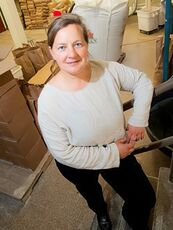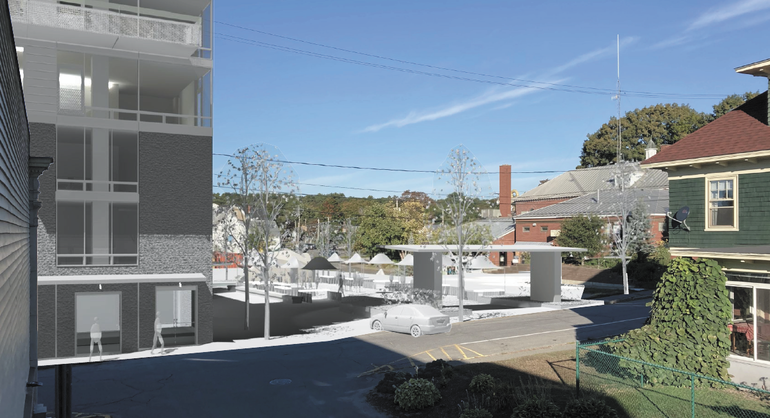
Maine Grains' Lambke plans mixed-use development in downtown Skowhegan
 Courtesy / Land & Furrow LLC
A rendering of one possiblity for the mixed-use building, left, that is being designed for a lot in downtown Skowhegan that once housed the Kennebec Inn, with a pedestrian plaza between the new building and Maine Grains, owned by Amber Lambke, who's developing the project.
Courtesy / Land & Furrow LLC
A rendering of one possiblity for the mixed-use building, left, that is being designed for a lot in downtown Skowhegan that once housed the Kennebec Inn, with a pedestrian plaza between the new building and Maine Grains, owned by Amber Lambke, who's developing the project.
Amber Lambke, CEO of Maine Grains, has bought an adjacent vacant lot in Skowhegan, with plans for a mixed-use development that expands the town's growing food hub, and will support entrepreneurs and add downtown residential units.
Town development officials say the project for the lot, which was owned by the Skowhegan Economic Development Corp., will add a vital element to what has been a hole in downtown, and be key to the town's growth as an agricultural food hub.

The lot, about a quarter acre in size, was listed for sale by the SEDC in August 2018, shortly after the historic Kennebec Inn was torn down. The three-story clapboard building had been vacant since 2011 and was falling apart. The lot was initially listed for $129,900, and SEDC officials said they were looking for proposals for commercial or mixed-use development of the lot.
Lambke, operating as Land & Furrow LLC, has an agreement with SEDC that gives her up to a year to have an approved construction plan with the town, and up to four years after that to build before payments are due. The purchase price hasn't been made public.
"Our feasibility and architectural work are well underway and we are appreciative of the runtime that this agreement gives us to align financing and key partners," she told Mainebiz Wednesday.
Lambke said she'd had her eye on the lot, which is not only adjacent to Maine Grains in the former Somerset County jail building, but also next to the town's long-running farmers' market and municipal parking lot.
"We were thrilled when SEDC purchased the dilapidated building in order to tear it down and make room for future development," she said. "With the lot right next door to Maine Grains, and our vision to continue to grow our enterprise downtown, we have been interested in the lot all along."
She said that after SEDC managed the teardown and the asbestos abatement in 2018, her team had been working with the economic development board ever since "to find a mutually agreeable vision, price and timeline."

Food hub, residential, plaza, and more
In general, Lambke plans an expansion of Maine Grains as well as space for new and expanding food enterprises downtown. Her current vision also calls for upper-floor "intergenerational, modern and efficient living spaces."
She also envisions a ground-floor winter home for the Skowhegan Farmers’ Market, which is adjacent; a community event and education space; a child care center; and pop-up shops for businesses.
The new development will also frame a plaza between the grist mill and the new building, next to the town's municipal parking lot. The lot is downtown, a block from the river and the planned Run of River Whitewater Recreation Area.
Lambke is pursuing architectural plans and designs, and intends to begin construction within the next four or five years, she said.
“The future development will allow for Maine Grains to continue to grow and expand over the next five years, increasing operations, capacity, storage, and office space, while creating more jobs and benefitting the community,” said Lambke.
Jeff Hewett, SEDC executive director, said the board took the project on to help Skowhegan deal with a building that was in serious deteriorated condition and needed someone to remove it to make room for new growth. "Working with Amber on this new vision for Skowhegan is one more step forward," he said.
Kristina Cannon, executive director of Maine Street Skowhegan, said town development officials are thrilled about the plan.
"Not only will the development really affirm Skowhegan's position as the premier agricultural food hub in the region and one of the top in the state, it will also bring additional foot traffic to our community, adding to the vibrancy of downtown," Cannon said.
She said the development adds to ongoing projects in town, including Bigelow Brewing's expansion in a mill building on Island Avenue and the Run of River whitewater paddle and surf park project. "It will really ramp up revitalization efforts that are currently underway and lead Skowhegan into the future," Cannon said.
At the time the lot was listed, Hewett, noted that it is "prime real estate in the heart of downtown."
"The renewal of this lot just adds to the ongoing revitalization efforts in Skowhegan," he said.
Lambke’s project has received some early support from local philanthropic investors as well as a feasibility study grant from the Maine Community Foundation's Cummings Fund and the SEDC. The study revealed growth aspirations of existing and new businesses that support the agricultural economy of central Maine and identified several new entrepreneurs who would be interested in sharing space in a building on the Maine Grains campus.

Coming full circle as community hub
The Kennebec River Inn building had been on the site since 1904, and was vacant since 2011. The building had fallen into disrepair, and the SEDC bought it in March 2018 for $73,000.
It was determined the building wasn't eligible for historic designation, and the organization ultimately spent $147,000 to tear it down, including asbestos abatement — 90% of the building was covered with asbestos — in July of that year.
The SEDC listed the building, looking for multi-use development proposals.Members of the corporation were enthusiastic about Lambke’s expansion plans and worked with her to negotiate agreeable terms for the sale agreement, according to an SEDC news release.
Before the Kennebec River Inn, a wing of of the Heselton House Hotel, was moved from the lot where the municipal building now is to the site in 1901, and converted into the two-story Maine Central Hotel. After it was expanded, a third floor was added when it became the Kennebec River Inn, in 1904.
Throughout the 1900s, the building was a popular hotel, the site of a busy train station and a community gathering place.
Lambke's plan is for the site to once again be the heart of the community, and said she welcomes project ideas from the community, and even has an email address they can contact, landandfurrow@gmail.com.
“Now that we have successfully secured the lot with the economic development corporation’s support, I look to my fellow community members and stakeholders to help inform the scope and scale of the project," Lambke said.
The project comes in what has been a busy year for the 2014 Mainebiz Woman to Watch. Her grist mill has seen a surge in online orders since the pandemic hit and more people started baking bread at home, prompting her to hire staff and expand product lines.













0 Comments